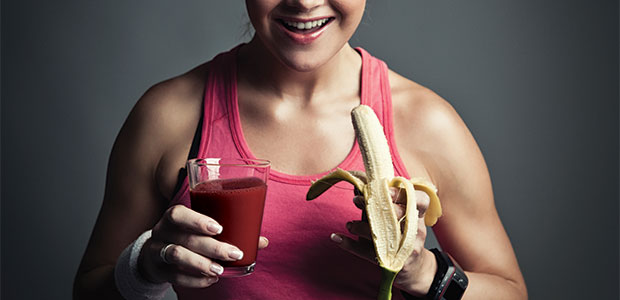Advertisement
Top Workout Foods
Supercharge your training session

From ancient Greek Olympians who sometimes ate only meat prior to competing, to modern-day marathon runners who load up on carbohydrates before an event, athletes have long sought to improve their physical performance by consuming certain foods. Research continues to support what many exercise enthusiasts already know—diet and physical activity go hand in hand.
The impact of foods on performance
Eating the right foods before and after a workout may promote optimal glycogen levels, maintain blood glucose levels, and provide the protein needed to build and repair muscle tissue.
Packed with nutrients that provide energy, aid in muscle recovery, and decrease inflammation, the following foods may provide the fuel needed to power through a tough workout—and improve recovery time afterward.
Pre-workout energizers
Oatmeal
The main function of carbohydrates in the diet is to provide the body with energy. While eating carbohydrates before a workout provides fuel for muscles, eating the right type of carbohydrates promotes optimal fat oxidation as well.
In a study published in the Journal of Nutrition, researchers found women who ate a breakfast that rated low on the glycemic index (GI) three hours before walking 60 minutes on a treadmill, burned almost twice the amount of fat during exercise compared to those who ate a breakfast with a high GI rating.
A good source of dietary fibre, complex carbohydrates such as oats take longer to digest than their refined counterparts. As a result, oatmeal scores low on the glycemic index, as it does not cause blood sugar levels to rapidly spike.
Beets
When it comes to naturally enhancing athletic performance, beets may be hard to beat.
A study published in the Journal of the Academy of Nutrition and Dietetics found that fit individuals ran faster after consuming 200 g of baked beets (approximately four medium beets), 75 minutes prior to running 5 km on a treadmill.
Although beets are rich in a number of nutrients required by the body to perform optimally, researchers believe it is the nitrates in them that are responsible for this performance-enhancing effect.
Nitrates derived from vegetables are thought to increase oxygen delivery to muscles by improving blood flow.
Watercress
Packed full of health-promoting nutrients and a surprising source of muscle-building protein, watercress is a nutritional superstar.
Preliminary research suggests that the many antioxidants found in this super green may protect the body from damage caused by free radicals produced during intense exercise.
In one study, researchers from Edinburgh Napier University found that when men ate approximately 85 g (2 1/2 cups) of watercress prior to an intense workout, the antioxidants in the participants’ blood increased, while DNA damage caused by the release of free radicals decreased.
Better yet, the researchers also found that eating watercress two hours before exercise offered the same DNA-protecting benefit as eating it consistently over a period of weeks.
Watermelon
Brimming with antioxidants including vitamin C, beta carotene, and lycopene, watermelon may ease the pain of a tough workout, research suggests.
A study published in the Journal of Agriculture and Food Chemistry found that athletes who consumed juice of this summer favourite an hour before exercise experienced significantly less muscle soreness compared to the level of soreness experienced after consuming a placebo drink.
Researchers credit the amino acid L-citrulline found in watermelon with this pain-alleviating effect. L-citrulline is thought to improve blood flow in the body and to help make certain proteins.
Post-workout refuellers
Chocolate milk
The four-to-one ratio of carbohydrates to protein found in chocolate milk may make it an ideal post-workout recovery drink.
Research suggests the nutrients in fat-free or low-fat chocolate milk may help the body to reduce muscle damage after exercise as well as commercially available sports drinks.
In one study, researchers from Southern Connecticut State University had male runners drink 16 oz (480 mL) of fat-free chocolate milk following a fast-paced 45-minute run. The researchers found that when the runners drank the chocolate milk, greater skeletal muscle protein synthesis (a sign of muscle repair) occurred, compared to when they consumed a carbohydrate-only drink.
Chia seeds
Whether you sprinkle them on a salad, toss them in your yogurt, or eat them on their own, highly nutritious chia seeds are packed full of nutrients that may aid post-workout recovery.
One 1 oz (28 g) serving of these super seeds contains 4 g of muscle-building protein; 18 percent of the daily value of bone-healthy calcium; and 30 percent of the daily value of manganese, a trace mineral required for optimal carbohydrate metabolism, calcium absorption, and proper regulation of blood sugar.
Chia seeds are also a good source of omega-3 fatty acids. Research suggests omega-3s may benefit exercisers by reducing post-workout inflammation and muscle soreness.
Banana
Eating a nutrient-rich banana after a prolonged exercise session may help the body restore essential electrolytes, vitamins, and minerals lost in sweat.
Bananas are especially rich in the electrolyte potassium, the trace mineral manganese, and a number of B vitamins including B6, riboflavin, and thiamine.
B vitamins play an important role in converting food into energy. In a study published in the International Journal of Sport Nutrition and Exercise Metabolism, researchers found that physically active individuals with low levels of B vitamins perform worse during high-intensity exercise than those with adequate levels. The study also found that low levels of B vitamins contribute to a reduction in the body’s ability to repair muscles and build muscle mass.
Greek yogurt
Containing 18 g of protein per 170 g serving, Greek yogurt has double the amount of protein found in regular yogurt.
Dietary protein is essential for muscle growth and aids in the repair of damaged cells and tissues. When consumed after a workout, protein has been shown to aid in muscle recovery, promote lean body mass, and boost immune function.
For added recovery benefits, blend yogurt with blueberries to make a post-workout smoothie. Preliminary research has found compounds in blueberries to have antioxidant and anti-inflammatory properties that may aid in muscle recovery.





